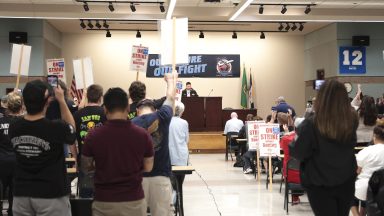

Union members at Boeing have begun to walk off the job after overwhelmingly rejecting a proposed four-year contract with the troubled aircraft manufacturer.
“This is about respect. This is about addressing the past, and this is about fighting for our future,” said Jon Holden, the president of District 751.
Here’s everything you need to know about the strike, where more than 30,000 union members are walking off the job.
What Was in the Proposed Contract?
The proposed contract, agreed upon by union leaders and company management on Sunday after months of negotiations, included several gains for workers but fell short of the union’s initial demands.
The deal included a 25 percent raise over four years, though the unions initially demanded a 40 percent increase. It also offered a $3,000 ratification bonus for each union member. Additionally, Boeing had agreed to increase its annual contributions to the union’s 401(k) plan by up to $4,160 per worker, cover more health care costs, provide 12 weeks of paid parental leave, and improve work-life balance by reducing mandatory overtime.
Kelly Ortberg, Boeing’s new chief executive, urged employees to approve the deal, stating, “A strike would put our shared recovery in jeopardy, further eroding trust with our customers,” in a video statement on Wednesday.
The strike vote passed decisively with 96 percent approval, far exceeding the two-thirds majority required to initiate a walkout, after 95 percent of members rejected the contract that union leaders had described as “the best contract we’ve negotiated in our history.”
When Did the Strike Start?
Aircraft assembly workers walked off the job early Friday at Boeing factories near Seattle, Washington. The strike started at 12:01 a.m. PDT, less than three hours after the local branch of the International Association of Machinists and Aerospace Workers announced the results of the vote.
The rejection of the proposal on Thursday reflects resentment among workers over concessions made in past talks, including the loss of pension benefits a decade ago, which the union had sought to reinstate.
Holden had said in a statement several days before the strike that union leaders had recommended approving the deal because “we can’t guarantee we can achieve more in a strike.” He added then that the union would “protect and support” whatever decision the members make.
In a statement on Friday after the vote, Boeing said it was “committed to resetting our relationship with our employees and the union.” The company said it was “ready” to continue negotiations on a new labor contract.
What Happened at the 2008 Strike?
The last Boeing strike, in 2008, lasted 50 days. It was the longest at Boeing since a 10-week walkout in 1995, which cost the company about $100 million daily in deferred revenue. The contract that ended the 2008 dispute has since been extended twice.
What Will the Strike Impact?
Boeing plays a substantial role in the U.S. economy, employing nearly 150,000 people across the country—almost half of them in Washington State—and is one of the nation’s largest exporters. In addition to commercial aircraft, the company manufactures military jets, rockets, spacecraft, and Air Force One, making it a global symbol of America’s manufacturing strength.
If the current strike lasts as long as the 2008 strike, it could cost Boeing at least $3 billion, according to an estimate by Cai von Rumohr, a research analyst at investment bank TD Cowen. Holden stated that members are prepared to “stay out” as long as necessary to secure a better deal this time.
Source link





